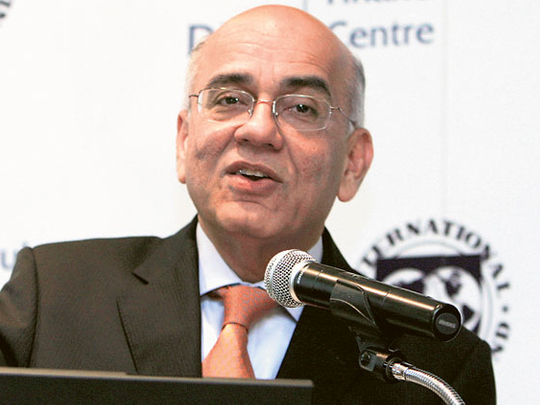
Dubai: The International Monetary Fund has raised its projection for Gulf's economic growth in 2011 from 5.2 per cent to 7.8 per cent, as oil production expands to stabilise global oil supply in the face of supply disruptions elsewhere.
This follows five per cent nominal gross domestic product (GDP) growth in 2010. GCC non-oil growth is set to accelerate by more than one percentage point to 5.3 per cent this year, the International Monetary Fund said yesterday in its regional outlook for Middle East and Central Asia.
For most oil exporters in the Gulf, the expected increase in oil prices — from $79 per barrel to $107 per barrel — and production volumes will lead to higher growth in 2011 and stronger fiscal and external balances, notwithstanding recent increases in government spending, the IMF said.
Average real GDP growth (excluding Libya) is projected to reach 4.9 per cent this year from 3.5 per cent last year, while non-oil growth is projected to stay at 3.5 per cent this year.
Nominal GDP growth
For the Gulf, the nominal GDP growth is projected to reach 7.8 per cent this year as an increase in oil production is expected to stabilise global oil supply in the face of supply disruptions elsewhere.
The UAE's real GDP is projected to grow at 3.3 per cent and with the inflation projected at 4.5 per cent, the nominal GDP growth will be 7.8 per cent.
The oil exporters' combined external current account surplus is estimated to increase from $172 billion to $378 billion (excluding Libya), and for the Gulf from $136 billion to $304 billion this year.
Short-term fiscal expansion by Gulf oil exporters has been financed by higher oil revenues but may have permanently raised spending, the IMF said.
Increased spending
Many oil exporting countries have ample fiscal space and have increased spending in response to domestic unrest and increased uncertainty, and to cushion the impact of rising food and fuel prices.
"The huge government spending programmes announced across the region following the political turmoil in some countries are expected have a positive impact on the overall GDP growth in the region. Despite the substantial increase in fiscal spending programmes, many oil exporters are likely to experience budget surpluses this year as oil prices have kept up the upward momentum," said Masoud Ahmad, Director of the IMF's Middle East and Central Asia Department.
In Bahrain and Oman, the newly created Gulf Development Fund is expected to provide an additional $10 billion to each country (40 per cent of 2010 GDP in the case of Bahrain) to finance housing and infrastructure costs.
With rising public spending in the region, the IMF observed that the fiscal health and external balances of oil exporters will be a function of oil prices.
"The break-even prices of oil to balance the budgets of most Gulf countries have gone up substantially. The downside risk of rising break-even levels [of oil prices] is that in the unlikely event of a sustained decline in oil prices, these countries could face prolonged budget deficits," said Ahmad.
Commenting on the IMF growth forecast for the region, Brad Bourland Chief Economist and Managing Director, Proprietary Investments Jadwa Investment said the public spending boost announced by various governments in the region can have only temporary impact on GDP growth. "Sustainable growth is not going to happen on the back of high oil prices and high government spending. Governments in the region should focus on creating sustainable employment," said Bourland.
Rising food prices
The IMF has warned that the Middle East in general, and the GCC in particular could face inflation challenges as increased government spending applies greater demand pressure and rising global food and energy prices could transmit to the region through imported inflation as most of the Gulf countries have dollar pegged currencies.
With food and fuel accounting for about half of many countries' consumer price indices, and commodity price shocks likely to be rather persistent, regional central banks will need to pay greater attention to inflation when setting policy rates and the overall stance of monetary policy.
Upward pressure on policy rates will also come from a rising global interest rate environment and increasing sovereign risk premiums. Inflation is expected to increase in almost all Middle East countries this year, to an average of 11 per cent for the oil exporters as a group.
Pick-up of inflation
The Gulf is expected to see a pick-up in inflation in 2011 to 5.3 per cent from 3.2 per cent in 2010.
The UAE's inflation is projected to grow from 0.9 per cent in 2010 to 4.5 per cent in 2011. "Oil exporters should monitor the second-round effects whereby food inflation translates rapidly into non-food inflation. Some governments, particularly in the GCC, will need to carefully monitor the impact of expansionary fiscal spending on aggregate demand to prevent a resurgence of inflationary pressures," the IMF report said.










